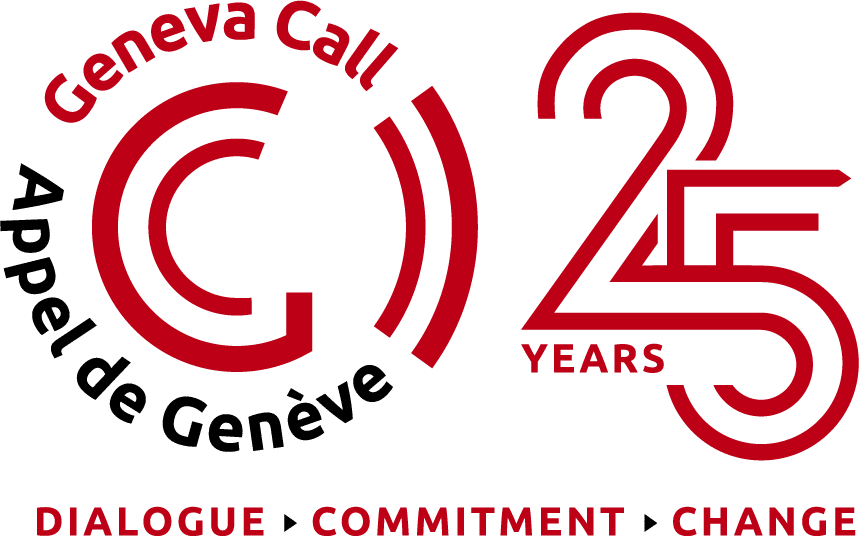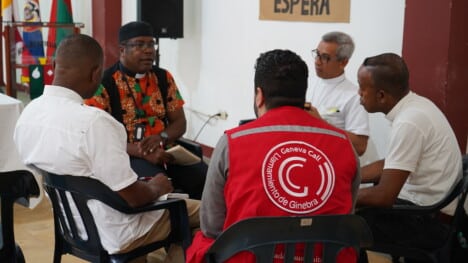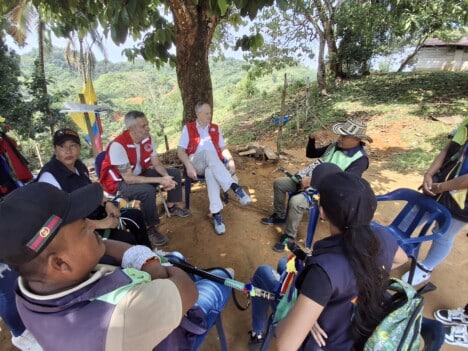Colombia
Thematic areas: Humanitarian Norms – Community Empowerment – Humanitarian Access – Antipersonnel Mines – Protection of Civilians – Forced Recruitment of Children
Context
Colombia is currently experiencing a conflict that has lasted for over 60 years. According to the country’s Single Registry of Victims, between January 1985 and June 2024, 9,737,008 individuals were registered as victims of the armed conflict.
In 2016, the FARC-EP agreed to demobilize and transform into a political party, receiving very limited support in national elections. Since 2019, Colombia has seen a proliferation of armed groups and de facto authorities (AGDAs) filling the void left by the FARC, accompanied by an intensification of hostilities.
At present, the most powerful national armed groups are the Gaitanista Self-Defense Forces of Colombia (AGC, also known as Clan del Golfo), which is the strongest in terms of manpower, finances, and internal structure; the ELN; the Central General Staff (EMC or ex-FARC); the General Staff of Blocs and Fronts (EMBF); and the Second Marquetalia—both offshoots of the FARC.
There are also several regional groups, such as the “Comuneros del Sur” and the “Conquistadora Self-Defense Forces of the Sierra Nevada,” along with a multitude of urban criminal gangs that often ally with or confront the national AGDAs. The Colombian conflict is no longer purely political; it is primarily fought between semi-independent blocs—some hybrid, others fully criminal—with the national army as a third actor.
The conflict situation in Colombia remains deeply concerning, marked by both visible and hidden increases in violence and instability, despite ongoing peace talks. AGDAs continue to carry out attacks and pursue territorial control, resulting in civilian casualties, destruction, and displacement.
Geneva Call’s Activities in the Country
In Colombia, Geneva Call works to mitigate the humanitarian impact of the armed conflict by promoting respect for International Humanitarian Law (IHL) among AGDAs, strengthening community protection, and facilitating humanitarian access in areas where needs are urgent and institutional presence is limited.
Promoting IHL Compliance Among AGDAs
Geneva Call focuses on increasing AGDAs’ adherence to humanitarian norms. Although Colombian law imposes restrictions on direct engagement with active combatants, Geneva Call is actively working to obtain the necessary authorizations to advance such dialogues within the framework of the law.
In the meantime, secure communication channels have been identified and consolidated—via proxies—to establish contact with AGDAs at both national and municipal levels. These channels enable the sharing of key humanitarian messages, raise awareness about IHL obligations, and support behavior change processes for the benefit of civilian populations.
Strengthening Community Self-Protection Capacity
Geneva Call works closely with community leaders in the departments of Arauca, Nariño, and Norte de Santander to enhance their capacity to protect themselves against IHL violations. This approach is grounded in trust-building, IHL training, and strengthening their ability to negotiate with armed groups to protect community members.
Through workshops, practical exercises, and ongoing support, communities are assisted in identifying their risks, prioritizing protective measures, and implementing them independently and safely.
Methodologies are also being developed to protect public infrastructure in high-risk areas, such as schools, health centers, and community spaces. As part of this effort, teachers, medical staff, first responders, and municipal ombudspersons (Personeros Municipales) are being trained to respond to threats in a coordinated manner.
Strengthening the Catholic Church’s Mediation Role
In 2025, Geneva Call partnered with the National Secretariat of Social Pastoral (SNPS), the social arm of the Catholic Church. In Colombia, religious personnel play a crucial mediating role between civilians and armed groups, thanks to their moral authority and neutrality.
Through “Pastoral Dialogues,” Geneva Call will strengthen the capacity of priests and bishops to negotiate with AGDAs in favor of civilian protection.
As a first step, 55 priests from the Istmina and Bajo Cauca regions were trained.
KEY FIGURES
As of July 2024, Colombia’s population was estimated at around 51 million people. According to OCHA, approximately 10 million of them currently live in areas controlled or influenced by AGDAs.
Between January and May 2025, mass displacements increased by 128%, with more than 68,200 people forcibly displaced.
Confinement incidents rose by 70% in the first five months of the year, affecting over 91,100 individuals.
Between 2022 and mid-2025, Geneva Call has trained more than 18,000 people in International Humanitarian Law. During the same period, 31 communities have been supported and strengthened. Geneva Call has worked with six Indigenous Peoples—Embera Eyábida, Embera Chamí, Embera Dóbida, Gunadule, Senú, and Barí—and has implemented 24 protection measures.
More than 1,140,000 people engaged in various social media campaigns to raise awareness about the core rules of International Humanitarian Law.
Read our Annual Report to learn more about our work in Colombia in 2024.
Follow Geneva Call in Colombia on Facebook – Instagram – X – LinkedIn – Youtube.
Contact information:
Giuliano Perseu – COUNTRY DIRECTOR
gperseu@genevacall.org


